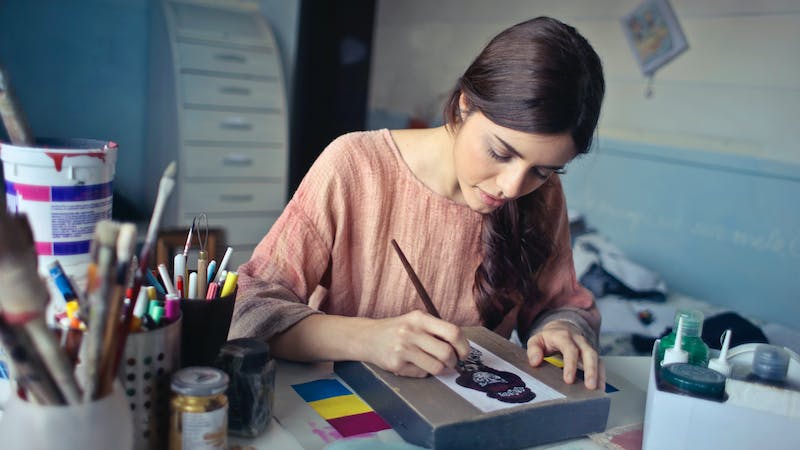Looking Beyond the Canvas: The Benefits of Painting
Painting is more than simply a hobby; it’s a healing process that has many positive effects on one’s mind, body, and spirit. Painting is a gateway to great self-awareness and introspection, allowing you to better comprehend your innermost feelings, ideas, and motivations. Furthermore, when you show others your artwork, you boost their spirits and encourage them via your own creativity.

The great news is that you don’t need to possess extraordinary painting skills in order to enjoy the numerous advantages of painting. Whether you engage in it for leisure or occasionally as a hobby, there are still potential advantages you can gain. Take this as your cue to go on a painting adventure of your own accord. In this piece, we’ll outline all the ways in which taking up painting might improve your life.
Boosts Creativity
Choosing colors, visualizing forms, and experimenting with methods can lead to new forms of creative expression. When you stare at a blank canvas and attempt to make something beautiful out of it, you’re really engaging the part of your brain that’s responsible for imagination and original thought, which is great for your artistic development.
So, whether you like abstract art, custom couple paintings, or watercolor landscapes, giving in to your creative urges in this way might help you stimulate your dopamine and produce some stunning works of art. Your imagination will also flourish as you acquire new skills and develop at your own pace.
Improves Memory
Painting is great for the areas of the brain that are responsible for recall and focus. To paint is to imagine, create, and put one’s ideas into action. Using your imagination and creativity frequently lowers the likelihood that you’ll have memory loss. Observing the object you’re painting and mentally assessing its form, size, texture, and color is great practice for your spatial awareness, which can also improve your memory.
There is an inverse correlation between the use of creative activities like writing, painting, and sketching and the occurrence of diseases that cause memory loss in old age. The risk of developing Alzheimer’s disease and other forms of dementia drops when you make time for creative pursuits.
Promotes Optimism
Making art that inspires joy may be a powerful tool for combating pessimism. Feelings of pride and satisfaction arise as you move from beginner to intermediate and advanced painting classes. Your negative feelings will lessen and your positive ones will grow as you reflect on and celebrate your successes.
On top of that, taking up painting as a hobby will expand your appreciation for the world around you. A single tree branch or cloud formation may teach you to find beauty in everything . And appreciating the splendor of your surroundings improves your mood and may even reduce your chance of developing a mental disorder.
Builds Non-Verbal Communication Skills
Engaging with visual elements on a regular basis can greatly enhance your nonverbal communication skills, enabling you to effectively convey your thoughts and emotions through visual means rather than relying solely on verbal expression. By immersing yourself in visual experiences, you can expand your library of nonverbal “vocabulary,” empowering you to communicate in diverse and creative ways that transcend the limitations of language. And this is great for individuals who may feel hesitant to express themselves verbally. Plus, it’s a great conversation starter since it gives you something in common with artists and art lovers all across the world.
Supports Emotional Wellbeing
Painting has been shown to boost mental well-being and is also helpful for enhancing one’s EQ and personal development. Images have the ability to convey and express ideas and concepts that are beyond the scope of words and thinking. By doing this, you’ll be forced to examine your own feelings, some of which you might not even be aware you have.
In addition, experimenting with various styles of painting can provide light on the origins of emotions like joy, sorrow, love, and even rage. People who watch your paintings may experience some of the feelings you had when you were working on them. As they say, a picture is worth a thousand words, and so is your painting!
Develop Critical Thinking Skills
An artist’s use of critical thinking abilities is evident in the way they employ abstract reasoning to realize a number of possible compositional outcomes in their work. As an example, when making an artwork, you need to think about things like which brush to use and how to blend colors. And though it may seem like an easy challenge, making these kinds of judgments promotes problem-solving abilities and teaches you to build novel strategies for approaching new problems.
Moreover, the results might not necessarily be what you expect them to be. Sometimes you’ll have to work within constrained parameters, and doing so will demand that you employ some creative problem-solving talents.
Takeaway
When we expand our view beyond the canvas, we see that painting is more than simply a pastime; it’s a transforming healing process with many positive effects on our mental, physical, and spiritual health. Taking up painting as a hobby is a great way to learn more about yourself by encouraging introspection and the discovery of your own motives and emotions. In addition, when you show your work to others, you provide them with motivation and boost their spirits with your originality. Painting can have a huge effect on your life and well-being, and you’ll find this out as you experiment with the canvas and find new ways to express yourself.


